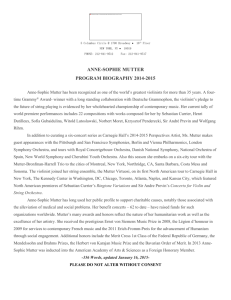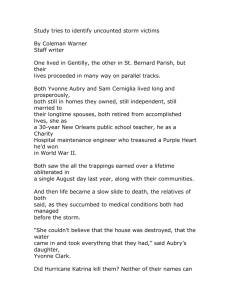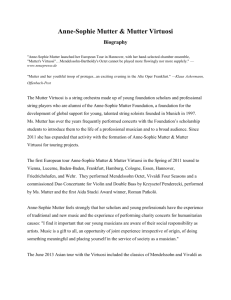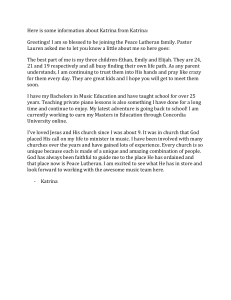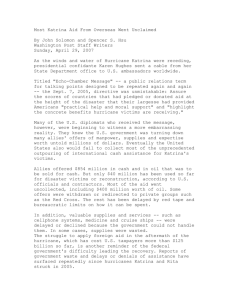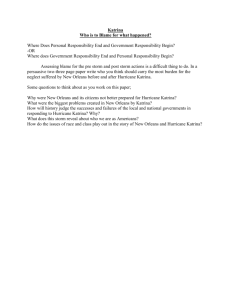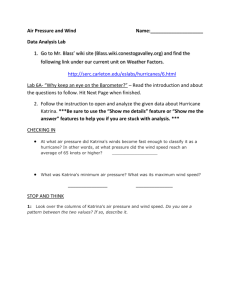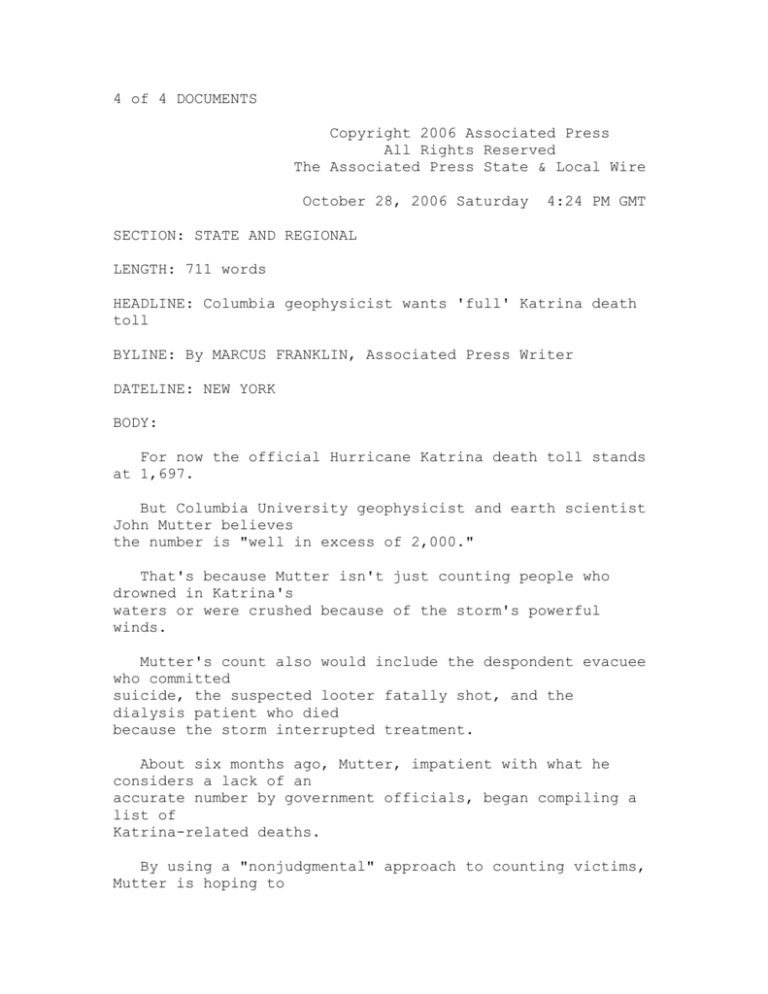
4 of 4 DOCUMENTS
Copyright 2006 Associated Press
All Rights Reserved
The Associated Press State & Local Wire
October 28, 2006 Saturday
4:24 PM GMT
SECTION: STATE AND REGIONAL
LENGTH: 711 words
HEADLINE: Columbia geophysicist wants 'full' Katrina death
toll
BYLINE: By MARCUS FRANKLIN, Associated Press Writer
DATELINE: NEW YORK
BODY:
For now the official Hurricane Katrina death toll stands
at 1,697.
But Columbia University geophysicist and earth scientist
John Mutter believes
the number is "well in excess of 2,000."
That's because Mutter isn't just counting people who
drowned in Katrina's
waters or were crushed because of the storm's powerful
winds.
Mutter's count also would include the despondent evacuee
who committed
suicide, the suspected looter fatally shot, and the
dialysis patient who died
because the storm interrupted treatment.
About six months ago, Mutter, impatient with what he
considers a lack of an
accurate number by government officials, began compiling a
list of
Katrina-related deaths.
By using a "nonjudgmental" approach to counting victims,
Mutter is hoping to
paint a fuller, if not more accurate group-portrait of the
victims. In addition,
Mutter believes, such a comprehensive list will yield
information that others
can use to better plan for future disasters.
"I think we understand the financial losses better than
the human losses and
I think that's outrageous," said Mutter, who is deputy
director of The Earth
Institute at Columbia. "We should measure tragedy in human
terms not financial
terms.
"We hope to compile a list that is comprehensive enough
that others using
different definitions can then compile their own lists."
Alluding to sharp criticism of a slow and inadequate
response by federal,
state and local authorities, Mutter said the list could
help disaster planning
officials by helping them determine which populations and
regions are most
vulnerable. Although, it's already well-known that in the
case of Katrina, it
was the elderly and Lower Ninth Ward in New Orleans.
On an emotional level, Mutter sees his list, which he
has put online, as a
"remembrance" for all of the storm's victims.
"I'm trying to make a granite wall for the Katrina
victims," said Mutter,
comparing his virtual list to the Vietnam Memorial in
Washington, D.C.
"I feel we should have a complete list," Mutter
continued. "I think everybody
who died as a result of the Katrina catastrophe ... should
be counted in a way
to memorialize them. And to just know the number."
Mutter and his research assistant, Amatullah R'id, began
by poring over
coroners' lists and obituaries, and contacting relatives,
churches and social
service organizations.
So far, they've collected at least 1,250 names,
according to The Earth
Institute's web site. A quarter of the names have yet to be
accounted for by
officials, the site claims.
Among the Gulf Coast states with Katrina-related deaths,
there isn't a set
standard of criteria for counting victims. In Mississippi,
for example, the 231
deaths are classified as a direct result of the storm, said
Reed O'Brien, a
spokesman at that state's Emergency Management Agency.
But in Louisiana officials appear to be classifying
deaths more fluidly. As
of Aug. 1, the Katrina-related death toll in Louisiana
stood at 1,464, according
to Kristen Meyer, a spokeswoman for the state Department of
Health and
Hospitals. There are 135 still missing, she said.
The number of deaths included "indirect" deaths. The
best example of such
deaths, Meyer said, was elderly people with medical
conditions that were
exacerbated by the storm and evacuation or cleanup workers
who died.
"The coroners are looking at the deaths on a case-bycase basis," Meyer said.
"It's a gray area."
In Alabama, two people died, in a car accident in heavy
rain, said Yasamie
Richardson, a spokeswoman for that state's Emergency
Management Agency.
Mutter, who studies the wide disparities in earth quake
tolls in economically
poor countries, said he was frustrated that he couldn't get
"a count that I
believe is accurate" from government officials.
"I'm not surprised in poor countries but I was surprised
that it would be
difficult to get a good number" in the United State, he
said.
"You hear about the 9/11 count all the time," Mutter
said. "They're very
different events but for some reason we seem to be not
concerned" about an
accurate Katrina death toll. "Maybe we're embarrassed
because the numbers are so
large. Maybe we don't want to admit that it was as large a
catastrophe as it
was."
The public can view the list online at
http://www.earth.columbia.edu and is
encouraged to add to it.
LOAD-DATE: October 29, 2006

